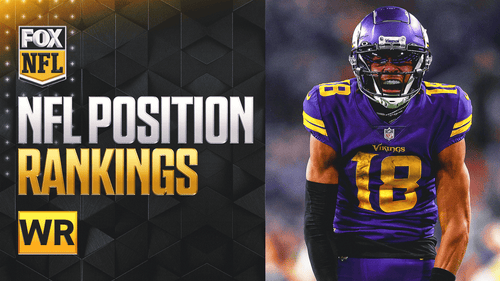
NFL Odd Jobs: The chaplain who's the spiritual confidant for the Bengals
Andy and Jordan Dalton were approaching their third wedding anniversary in 2014 when they decided to make another leap in their lives together. Both Christians, the Daltons wanted to make a stronger commitment to God by getting baptized as a married couple.
The Bengals’ quarterback and his wife approached LaMorris Crawford, the team chaplain, after couples’ Bible study and told him they wanted him to baptize them. Crawford said it’d be his honor and arranged to do the ceremony at his pastor’s backyard pool on June 15, 2014.
“To see someone make a decision with the platform that they have to wear what they believe, that moment for me was monumental,” Crawford says. “It was phenomenal. It was humbling, because he approached me about it. It was really humbling and exciting to see him and his wife do that together. It was great.”

Baptisms are just one part of Crawford’s chaplaincy. He’s a spiritual confidant and counselor for the Bengals’ 63 active and practice players, coaching staff and their significant others. Most, if not all, NFL teams have chaplains, though it’s believed that, like Crawford, they are not technically employed or salaried by the team.
Crawford is one of 12 team chaplains funded and supplied by Athletes in Action, a group founded in 1966 that focuses on athletes’ relationship with Christianity. The Bengals’ chaplain for the past four seasons, Crawford, 36, has led Bible studies each week during the season, met with players after every home game and baptized three Bengals.
Crawford’s Road to Damascus went through the South Side of Chicago. He never knew his father, and his teenage mother was killed when he was 10 months old. He grew up with his grandmother on welfare and said he tried selling drugs when he was just 14 to get enough money to buy nice sneakers. At 19 he became a Christian, and five years later while watching another story about an athlete’s dumb decision, he decided he wanted to help.
He enrolled at Olivet Nazarene University, about 60 miles south of Chicago, and graduated with a degree in sports recreation in 2006. Crawford became an academic counselor there, but he also moonlit as a speaker on the weekends, where he’d share his testimony, and also as a spiritual counselor for friends.
A few of his friends from when he was growing up made it as professional athletes (he didn’t say who because there’s a confidentiality in all this). His typical conversations involved helping these players deal with their families and their new wealth.

“I was helping a guy navigate what it means to honor your parents. There’s this idea [from parents] that ‘If it wasn’t for me, you wouldn’t be where you’re at so when I ask you for something, I need you to get it for me.’ I counsel them and say there’s a difference between honor and being taken advantage of.
“It’s our responsibility [as parents] to take care of our kids. They don’t owe us because it was our responsibility to take care of our kids. You want to honor them, but don’t feel like you owe them.”
A sports performance center out of Indiana caught wind of Crawford’s speaking and recruited him to hold a 25-minute “purpose call” on Sunday nights where he’d talk to about 150 athletes across the country on a conference call. That led him to meeting then Bills safety Jairus Byrd. Byrd’s father, Gill, was the defensive backs coach with the Bears, who held their training camp at Olivet.
In 2012 Crawford earned his Master of Organizational Leadership degree from Olivet—he does not have any formal divinity education—and moved to Indianapolis where he met with Colts chaplain Ken Johnson. Most teams don’t have their chaplains travel with them, so visiting teams will often ask the host team’s chaplain who he knows that can offer counsel or study with the team on Saturday nights before games. Johnson gave Crawford’s name to the Dolphins and Texans, and from there Crawford got in touch with Athletes in Action, which was looking to fill a vacancy in Cincinnati.

Chaplains have long had a place in football. Almost every college football program—state-funded or private—has a chaplain. In fact, American football grew out of an early 20th-century idea of Muscular Christianity. There’s not an NFL game where players and coaches from both teams do not huddle at midfield post-game for prayer.
“His testimony is very easy for our guys to understand and relate to,” Bengals coach Marvin Lewis says. “He just has a presence about him that makes them very comfortable with him, and it enables him to excel at aiding them in whatever they need aid with.
“It’s another release for the players. It’s another person they can bounce things off, they can speak with, to help them grow as young men, as husbands, as fathers. They deal with a lot of pressures that no one else understands but them—from family, friends, injuries, playing or not playing—all the things that come with being an NFL player.”
On Tuesday, which is typically the players’ off day, Crawford and his wife, Megan, lead couples’ Bible study at the Daltons’ home with about 14 other couples from the team. This year they read and discussed John and Lisa Bevere’s book The Story of Marriage. Megan meets with the women of the team—wives, fiancées, girlfriends, etc.—on Wednesdays and Thursday. Crawford leads a team Bible study of about 16 players in the afternoons after practice. In between there’s marriage counseling, discipleships and outreach.

Of course, not everyone is Christian or wants to be saved. There are agnostics, atheists, Muslims, Jews and members of other religions throughout the NFL. When the Bengals had a player who was Muslim, Crawford said he spent every Monday watching Monday Night Football with the player, and Megan counseled the player’s fiancée.
“Because of what I do, they already know where I stand,” Crawford said of non-Christian players. “So now how do I connect them? They are their own man. ‘This is what I believe and I don’t want that.’ But what we stand for as Christians, the foundation of who we are, is character. So I can still teach them on what it means to be a great father, a good husband, a good man, because the Bible talks about it. It’s the greatest book for life. Now if they even chose not to believe that, I’m a listener. If they need to bounce off me, I’m there. They may not like what I say, but if they keep coming, then evidently something’s working.”
Some NFL chaplains are on the sidelines during games, others are in the press box and a few, like Crawford, are in the stands. After the home games he goes to the locker room and visits with players to offer encouragement, win or lose. This season has seen more of the latter for the 4-7-1 Bengals, who have finished with a winning record and gone to the playoffs every year Crawford has been with them. But this down season doesn’t change Crawford’s approach to players because for him, it’s not all about that.
“I have a saying that inside every man lives a king and a warrior. Whichever you approach is the one that will respond,” Crawford says. “I tell guys that when you’re at work, you’re the warrior. When you come home you cannot come home to your wife as the warrior. You must come home to your wife as the king. She doesn’t want the warrior. You coach gets the warrior and your wife gets the king.
“For me, during this difficult time of ups and downs, I’m speaking to the king in them. I say ‘Good game man, that was a tough one. But you get to go home to your son. Your arm, your leg, your knee isn’t broken. Your leg your knee. You get to go home to your baby. Do you know how proud of you your son is? Do you know that he points to you and says that’s my daddy?’
“Even through all the difficult things and the losing that we’re going through now, I always try to find and speak to the king in them. Because that’s what’s going to matter.”
This article originally appeared on











